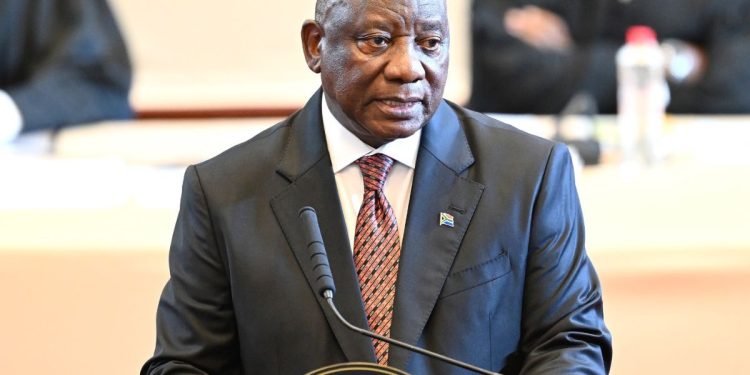President Cyril Ramaphosa’s 2025 State of the Nation Address (SONA) touched on a broad range of issues—peacekeeping efforts, infrastructure development, poverty alleviation, and anti-corruption measures. While the speech painted an optimistic vision for South Africa’s future, it ultimately lacked the decisive action and bold new policies many citizens were hoping for in a time of national crisis.
Honouring Fallen Heroes and Global Challenges
The president opened his address by paying tribute to 14 South African soldiers who lost their lives during a peacekeeping mission in the Democratic Republic of Congo (DRC). He described them as heroes who died for peace, not power or resources—a solemn reminder of South Africa’s commitment to silencing the guns on the continent.
Ramaphosa then transitioned to broader global challenges, including climate change, artificial intelligence, and geopolitical tensions, urging South Africans to remain resilient. He reaffirmed the country’s stance on human rights, equality, and inclusivity, emphasizing continued support for women, persons with disabilities, and the LGBTQI+ community.
The GNU and Medium-Term Development Plan
The president highlighted the recent formation of a Government of National Unity (GNU) and introduced the Medium-Term Development Plan, focusing on inclusive growth, poverty reduction, and building an ethical state.
However, while these priorities were well-defined, critics noted the lack of detail on how the government intends to tackle ongoing issues like corruption, mismanagement, and the lack of service delivery at the municipal level.
Infrastructure Development and Energy Stability
Key infrastructure projects, such as the Mtentu Bridge and Polihali Dam, were announced as part of a R940 billion investment plan over the next three years. Ramaphosa also claimed that South Africa had gone 300 days without load shedding since March 2024.
While this marked progress in addressing the country’s energy crisis, the president admitted that energy supply risks remain. He touted South Africa’s Just Energy Transition, with $13 billion pledged for renewable energy, while emphasizing the need for private-sector involvement.
Water Crisis and New Infrastructure Agency
The president acknowledged the country’s worsening water crisis, announcing the establishment of a National Water Resource Infrastructure Agency and securing R23 billion for seven major water projects.
Support for Small Businesses and Job Creation
A R20 billion Transformation Fund was announced to support black-owned and small businesses over the next five years. Ramaphosa promised to fast-track regulations to give women, youth, and persons with disabilities fair access to government contracts.
Additionally, a graduate recruitment scheme will be introduced to attract young talent into the public service.
Addressing Crime with Technology
Ramaphosa’s promise to expand the police force by 4,000 personnel and use artificial intelligence (AI) to fight crime was met with skepticism from many in attendance. The president emphasized efforts to combat organized crime and support victims of gender-based violence, highlighting the work of Thuthuzela Care Centres and GBV shelters.
Healthcare and NHI Progress
While the president claimed progress in preparing for the National Health Insurance (NHI) scheme, details were sparse. Plans to revitalize hospitals and clinics were mentioned, but many were left wondering how the NHI will be implemented or funded.
Education and Housing Developments
The president celebrated the 2024 matric pass rate of 87%, the highest in the country’s history, and announced plans to expand early childhood development and improve literacy and numeracy in schools.
On housing, Ramaphosa promised to build affordable homes closer to city centres and fast-track the release of underutilized state properties for development.
A Lacklustre Speech with Familiar Promises
Despite touching on key themes, Ramaphosa’s SONA 2025 left many South Africans disappointed. The speech lacked the bold solutions and concrete action plans needed to address the country’s most pressing issues—unemployment, inequality, and corruption.
For a country in need of decisive leadership, Ramaphosa’s address felt like a missed opportunity. Familiar promises without significant new policies left many questioning the government’s capacity to deliver real change.






















